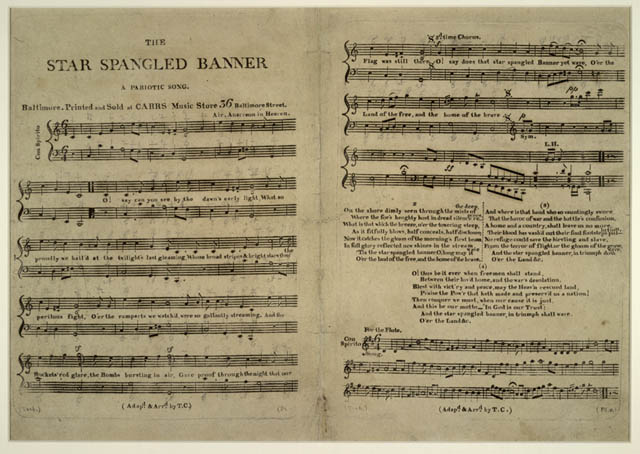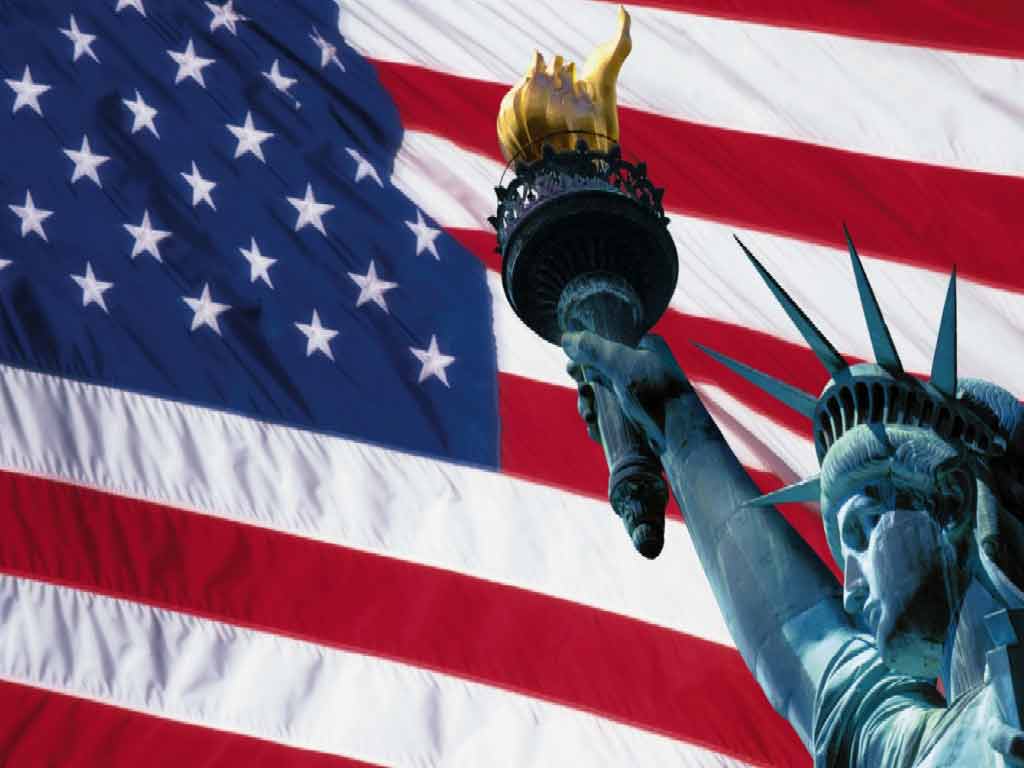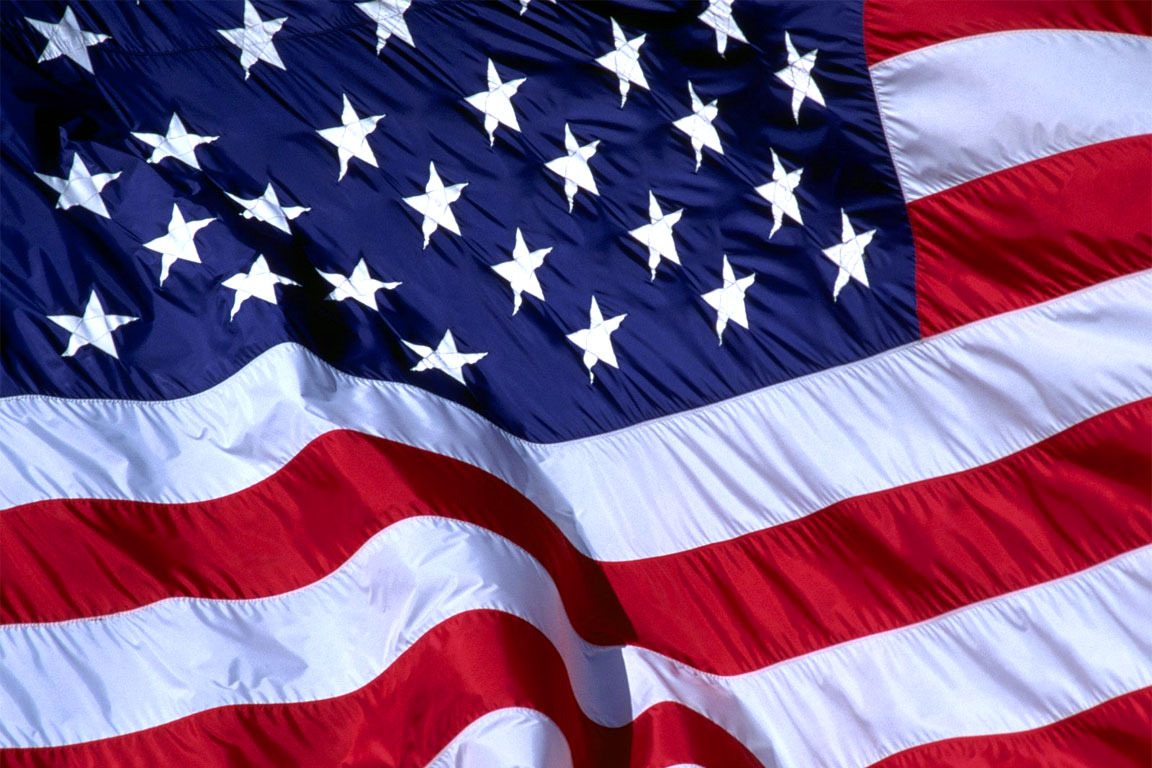Oh, say can you see, by the dawn’s early light,
What so proudly we hailed at the twilight’s last gleaming?
Whose broad stripes and bright stars, through the perilous fight,
O’er the ramparts we watched, were so gallantly streaming?
And the rockets’ red glare, the bombs bursting in air,
Gave proof through the night that our flag was still there.
O say, does that star-spangled banner yet wave
O’er the land of the free and the home of the brave?
On the shore dimly seen through the mists of the deep,
Where the foe’s haughty host in dread silence reposes,
What is that which the breeze, o’er the towering steep,
As it fitfully blows, half conceals, half discloses?
Now it catches the gleam of the morning’s first beam,
In full glory reflected now shines in the stream:
‘Tis the star-spangled banner! O long may it wave
O’er the land of the free and the home of the brave.
And where is that band who so vauntingly swore
That the havoc of war and the battle’s confusion
A home and a country should leave us no more?
Their blood has washed out their foul footsteps’ pollution.
No refuge could save the hireling and slave
From the terror of flight, or the gloom of the grave:
And the star-spangled banner in triumph doth wave
O’er the land of the free and the home of the brave.
Oh! thus be it ever when freemen shall stand
Between their loved homes and the war’s desolation!
Blest with vict’ry and peace, may the Heaven-rescued land
Praise the Power that hath made and preserved us a nation.
Then conquer we must, when our cause it is just,
And this be our motto: “In God is our Trust.”
And the star-spangled banner in triumph shall wave
O’er the land of the free and the home of the brave!
 “The Star-Spangled Banner – la bandiera adorna di stelle”, fu ufficialmente adottato come inno nazionale americano dal Congresso degli Stati Uniti il giorno 3 marzo 1931, anche se già dal 1889 era usato ufficialmente dalla Marina degli Stati Uniti e dal 1912 dalla Casa Bianca.
“The Star-Spangled Banner – la bandiera adorna di stelle”, fu ufficialmente adottato come inno nazionale americano dal Congresso degli Stati Uniti il giorno 3 marzo 1931, anche se già dal 1889 era usato ufficialmente dalla Marina degli Stati Uniti e dal 1912 dalla Casa Bianca.
Le parole dell’inno, dedicato alla bandiera a stelle e strisce degli Stati Uniti, sono quelle del poema The Defence of Fort McHenry scritto, nel 1814, dall’avvocato e poeta dilettante Francis Scott Key (Carroll City, 2 agosto 1779 – Baltimora, 11 gennaio 1843). Il testo diventò poi un canto patriottico sulla musica di “To Anacreon in Heaven”, una canzone popolare del compositore inglese John Stafford Smith, che inizialmente era usata usata per l’inno nazionale del Lussemburgo (Ons Heemecht).
Una pesantissima critica alla posizione Americana nella guerra del Vietnam è stata lanciata da Jimi Hendrix al Festival di Woodstock, quando ha suonato l’inno aggiungendo effetti di plettro e leva per simulare bombardamenti e sparatorie.

Traduzione dell’inno americano:
Di’, puoi vedere alle prime luci dell’alba
ciò che abbiamo salutato fieri all’ultimo raggio del crepuscolo?
Le cui larghe strisce e brillanti stelle, nella battaglia pericolosa,
sui bastioni che sorvegliavamo, sventolavano valorosamente?
E il bagliore rosso dei razzi e le bombe che esplodevano in aria
hanno dato prova, nella notte, che il nostro stendardo era ancora là.
Di’ dunque, sventola ancora la nostra bandiera adorna di stelle
sulla terra dei liberi e la patria dei coraggiosi?
Sulla costa, appena visibile nelle nebbie del mare
dove lo sprezzante nemico è immobile in timoroso silenzio
cos’è quella cosa che la brezza, sul crinale torreggiante,
soffiando con veemenza per metà mostra e per metà nasconde?
E quel che ora coglie il riflesso del primo raggio del mattino
e che riflessa nella piena gloria ora risplende sulla battigia:
È la bandiera adorna di stelle! Che possa sventolare a lungo
sulla terra dei liberi e la patria dei coraggiosi.
Dov’è quella compagnia che vanagloriosamente ha giurato
che la devastazione della guerra e la confusione della battaglia
ci avrebbero privato sia della casa che della nazione?
Il loro sangue ha cancellato la contaminazione delle loro sporche impronte.
Nessun rifugio ha potuto salvare il mercenario e schiavo
dal terrore della fuga, o dalle tenebre della morte.
E la bandiera adorna di stelle sventola in trionfo
sulla terra dei liberi e la patria dei coraggiosi.
Così sia quando gli uomini liberi terranno la posizione
tra le loro amate case e la desolazione della guerra!
Possa la nazione liberata dal Cielo essere benedetta con la vittoria e la pace,
sia lodato l’Onnipotente che ci ha creato e protetto come una nazione.
Dobbiamo perciò prevalere quando la nostra causa è giusta
e questo è il nostro motto: “Abbiamo fede in Dio“.
E la bandiera adorna di stelle per sempre garrirà
sulla terra dei liberi e la patria dei coraggiosi!





